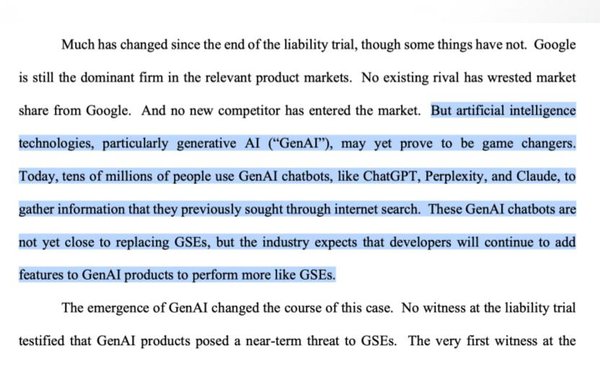
The rise of generative artificial
intelligence (GAI) this year seemed to have became the biggest unknown for U.S. District Judge Amit P. Mehta’s order released Tuesday following his decision in 2024 that Google created a search
monopoly for years that led to unfair competition.
“Much has changed since the end of the liability trial, though some things have not,” the court document stated. “Google is
still the dominant firm in the relevant product markets. No existing rival has wrested market share from Google. And no new competitor has entered the market. But artificial intelligence technologies,
particularly generative AI (“GenAI”), may yet prove to be game changers.”
Mehta’s order laid out some strict rules -- such as barring Google from entering or
maintaining exclusive contracts with companies like Apple that relate to the distribution of Search, Chrome, Google Assistant, and the Gemini app -- but declined to require more drastic remedies the
Department of Justice asked for, including the divestiture of its Chrome browser.
advertisement
advertisement
Google can continue to pay companies for non-exclusive placement and preloading of its search engine and
products like Chrome and the Gemini app. The judge decided that banning these payments could harm distribution partners, such as Apple.
The order required Google to share some data with rivals
in a bid to improve competition. Google will need to make data available to “Qualified Competitors" that an oversight technical committee will monitor, which will include certain search index
and user-interaction data, although not advertising data.
Qualified Competitors has been defined as a company that meets certain data-security standards, agrees to routine data security and
privacy audits, presents a sufficient plan demonstrating its intent to invest and compete in the general search engine and/or search text ads market, and does not pose a security risk to the United
States.
Mehta weighed the impact of GAI on the future of search, although the influence on his final remedies decision seemed based on today's technology.
While the DOJ
argued that Google's dominance in GAI was directly tied to its search monopoly, Mehta ultimately issued a conservative ruling that avoided the most aggressive remedies proposed by the government.
Even Google recognized that GAI had a strong influence on the remedies decision.
"Today’s decision recognizes how much the industry has changed through the advent of AI, which
is giving people so many more ways to find information," Google stated in a blog post. "This underlines what we’ve been saying since this case was filed in 2020: Competition is intense, and
people can easily choose the services they want. That’s why we disagree so
strongly with the Court’s initial decision in August 2024 on liability.”
Google has concerns about sharing search data with rivals. The company believes it
will impact its users and their privacy, and said it will review the decision closely.